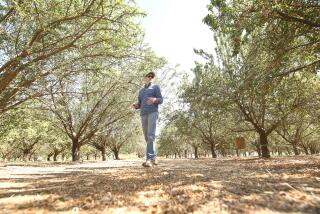Bug Against Bug : Work by Ventura insectaries is minimizing the threat of pesticides.
This monthâs pesticide spill, which put a rail tanker load of toxics into Northern Californiaâs water supply, need not have happened. Iâm not talking about railway safety, although that certainly needs to be looked into.
Iâm talking about pesticides. As reported in this paper, Gov. Wilson noted the effect on âour natural treasures when poisoned by man-made hazards.â
Today, I would like to point out some Venturans who are doing something to roll back the threat of the pesticide hazard.
Ventura County is at the forefront of the movement to control insects and to fertilize crops via non-toxic means.
One of the leading insectaries--a producer of beneficial insects that kill pests--is located here. Indeed, its fame has spread to the East Coast through newspaper articles--articles which apparently touched a nerve because the phones of Rincon-Vitova Insectaries in Oak View are suddenly ringing off the hook.
âWeâre doing a job that should be provided by government. There needs to be a balance between chemical insecticides and biologicals--now,â said Jan Bassari, who is in charge of marketing for the two facilities the company maintains here.
âBut research hasnât produced enough (beneficial insect strains) to completely eliminate the need for chemicals,â she said. âIf people were doing it right, we wouldnât be in business.â
As Everett Dietrick, the company founder, put it: âWeâre in the business of making the farmer money, not selling chemicals.â
In other words, theyâre in the education business and for the foreseeable future theyâre going to have to provide the beneficial insects themselves until farmers and gardeners take to breeding them. A ladybug is not a patentable item.
More about our local insectaries later.
First, a word about how people like you and me can âdo it right.â Until recently, the must book on non-toxic bug banishment was Shelia Daarâs âCommon Sense Pest Control,â which I advocated in a column last year. But, as the New York Times noted of the comprehensive $39 study, it was ânot a little pocket-size paperback to be read on the subway.â
Last week, Bantam released in quality paperback, âTiny Game Hunting--Environmentally Healthy Ways To Trap and Kill the Pests in Your House and Yardâ by Hilary Dole Klein and Adrian M. Wenner. Both live in Santa Barbara where Wenner is professor of Zoology at the University of California and Klein is a writer whose byline graces this edition of The Times.
âItâs so satisfying to see a little ladybug working in your yard,â Klein said in a tone so appealing it made me want to run out to Oak View and buy a gallon of the little creatures.
The book, which owes a lot to Daarâs pioneering study, is very well-organized. Look up any bug that is bothering you--in the house, in the yard, on the pet or on yourself--and find out how to dispatch it without poisoning yourself. The book gets into bug-banishment tricks like garlic and soap and water, or fruit-fly traps using banana peels.
It turns out that it is also possible to vacuum bugs off crops. Dietrick told me that.
âDekeâ Dietrick is also no slouch when it comes to turning a pithy phrase in the cause of âintegrated pest management.â He refers to the bugs he breeds and sells as âsmart bombs.â They kill only the undesirable insects.
I would evoke the image of a savvy shopper zeroing in on the bargains at the supermarket and zipping by the overpriced and outmoded stock.
These ladybugs, lacewings and predatory mites of Dietrickâs are determined to âgo to their host,â as he puts it, and not bother with anything else-such as biting you or me.
Dietrick and his colleague Alvaro Sequeria, employing natural pest-control processes originated by thrifty farmers in Saticoy back in the 1920s, are exporting beneficial insects to Latin America.
âThe amount of U.S. money flowing into Mexico to purchase organic vegetables there has influenced the state of Baja to resist chemical spraying,â Dietrick said.
According to Bassari, chemical companies in Central America, faced with the fact that their product is too expensive for the locals, have begun entering the beneficial bug market. Itâs cost-effective from the farmerâs standpoint. Since the beginning of the year, Rincon-Vitova and other such firms in the U.S. have been swamped with orders from farmers and gardeners from all over the world. The word is out. And for Californias in particular, just in time.
* FYI
For a catalogue: Rincon-Vitova Insectaries Inc., P.O. Box 95 Oak View, Calif. 93022. A paperback ($8.50) of Bantam Booksâ âTiny Game Hunting--Environmentally Healthy Ways To Trap and Kill the Pests in Your House and Gardenâ should be available at your local bookstore.
More to Read
Sign up for Essential California
The most important California stories and recommendations in your inbox every morning.
You may occasionally receive promotional content from the Los Angeles Times.










